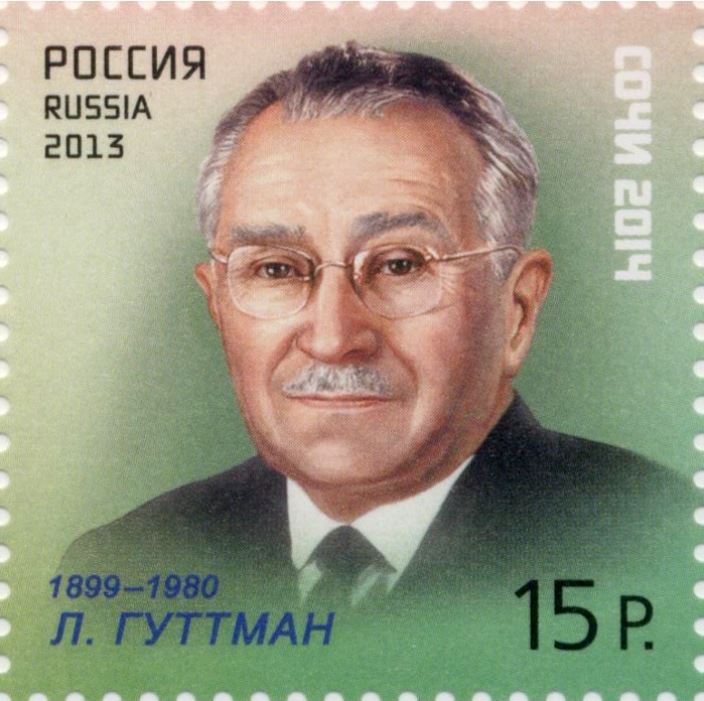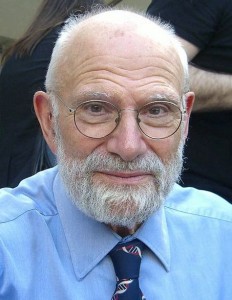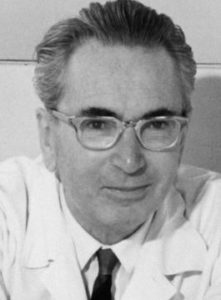Founder of the Paralympic Games
 Ludwig Guttman (1899-1980) was born to a German-Jewish family in what is now Poland. After serving in World War I, he volunteered at a hospital and first encountered a paraplegic patient. This inspired him to go to medical school and he went on to become a renowned neurosurgeon, specializing in spinal cord injuries and paralysis. He also taught at the University of Freiburg, where he supervised a Jewish fraternity that focused on fitness and physical training to give Jewish students more strength and confidence in the face of rampant anti-Semitism. When the Nuremberg Laws were passed by the Nazis, Guttman was stripped of his job and title. He was given an inferior position at the Breslau Jewish Hospital, where he eventually became the medical director. During Kristallnacht, Guttman witnessed the desecration of his synagogue and the abuse of his fellow congregants. That night, he admitted 64 Jewish patients that took refuge in his hospital, and was able to save 60 of them from deportation by the SS agents that came the next day. The following year, the Nazis gave him a visa and sent him on a medical mission to Portugal. Guttman never returned to Germany, and settled in England instead. He joined the Nuffield Department of Neurosurgery in Oxford. Guttman came up with the idea of turning paraplegic patients over in their beds every two hours to prevent bed sores, a small move that drastically cut the mortality rate. In 1943, the Royal Air Force asked Guttman to found and head the National Spinal Injuries Centre at Stoke Mandeville Hospital to look after injured pilots who commonly had spinal problems. It was here that Guttman realized how sports could be a powerful tool for rehabilitation. In 1948, he organized the first Stoke Mandeville Games for disabled war veterans, a huge success. Four years later, he turned it into an international event, and in 1956 was recognized by the IOC (International Olympic Committee) for his pioneering work. The Stoke Mandeville Games became an official part of the 1960 Rome Olympics, and by 1984 was known as the Paralympic Games. (When host city Mexico refused to hold the games in 1968, Guttman arranged for them to be held in Israel). Guttman founded what would become the English Federation of Disability Sport, as well as the International Spinal Cord Society. He was the first editor of the scientific journal Spinal Cord. The Guttmann Institute in Barcelona is named after him, as is the Ludwig Guttmann Prize awarded by the German Medical Society for Paraplegia. He was the subject of a BBC documentary called The Best of Men, and was knighted by Queen Elizabeth II in 1966. There are currently over 4400 athletes competing at the Tokyo Paralympic Games, the largest ever.
Ludwig Guttman (1899-1980) was born to a German-Jewish family in what is now Poland. After serving in World War I, he volunteered at a hospital and first encountered a paraplegic patient. This inspired him to go to medical school and he went on to become a renowned neurosurgeon, specializing in spinal cord injuries and paralysis. He also taught at the University of Freiburg, where he supervised a Jewish fraternity that focused on fitness and physical training to give Jewish students more strength and confidence in the face of rampant anti-Semitism. When the Nuremberg Laws were passed by the Nazis, Guttman was stripped of his job and title. He was given an inferior position at the Breslau Jewish Hospital, where he eventually became the medical director. During Kristallnacht, Guttman witnessed the desecration of his synagogue and the abuse of his fellow congregants. That night, he admitted 64 Jewish patients that took refuge in his hospital, and was able to save 60 of them from deportation by the SS agents that came the next day. The following year, the Nazis gave him a visa and sent him on a medical mission to Portugal. Guttman never returned to Germany, and settled in England instead. He joined the Nuffield Department of Neurosurgery in Oxford. Guttman came up with the idea of turning paraplegic patients over in their beds every two hours to prevent bed sores, a small move that drastically cut the mortality rate. In 1943, the Royal Air Force asked Guttman to found and head the National Spinal Injuries Centre at Stoke Mandeville Hospital to look after injured pilots who commonly had spinal problems. It was here that Guttman realized how sports could be a powerful tool for rehabilitation. In 1948, he organized the first Stoke Mandeville Games for disabled war veterans, a huge success. Four years later, he turned it into an international event, and in 1956 was recognized by the IOC (International Olympic Committee) for his pioneering work. The Stoke Mandeville Games became an official part of the 1960 Rome Olympics, and by 1984 was known as the Paralympic Games. (When host city Mexico refused to hold the games in 1968, Guttman arranged for them to be held in Israel). Guttman founded what would become the English Federation of Disability Sport, as well as the International Spinal Cord Society. He was the first editor of the scientific journal Spinal Cord. The Guttmann Institute in Barcelona is named after him, as is the Ludwig Guttmann Prize awarded by the German Medical Society for Paraplegia. He was the subject of a BBC documentary called The Best of Men, and was knighted by Queen Elizabeth II in 1966. There are currently over 4400 athletes competing at the Tokyo Paralympic Games, the largest ever.
Words of the Week
It might seem bizarre, but in my opinion science offers a surer path to God than religion.
– Paul Davies, renowned physicist

Russian commemorative stamp of Ludwig Guttman, in its “Sports Legends” series released before the 2014 Sochi Olympics.


 Feigele Peltel (1921-2012) was born in Warsaw, Poland. At 21 she joined the Jewish Combat Organization. Using her “Aryan” looks and fluency in Polish, she was able to pose as a Pole and come in and out of the Warsaw Ghetto. Through this, she smuggled weapons and supplies in, while saving countless children (and adults) by bringing them out of the ghetto. Her code name was ‘Vladka’, which she later adopted as her legal name. She also worked as a recruiting agent to bring more people into the resistance. One of these was Benjamin Meed, whom she would later marry in the U.S. Together they were among the key organizers of the infamous Warsaw Ghetto Uprising. Vladka wrote a popular book about her experiences, and along with her husband, continued to work in Holocaust education for the rest of her life.
Feigele Peltel (1921-2012) was born in Warsaw, Poland. At 21 she joined the Jewish Combat Organization. Using her “Aryan” looks and fluency in Polish, she was able to pose as a Pole and come in and out of the Warsaw Ghetto. Through this, she smuggled weapons and supplies in, while saving countless children (and adults) by bringing them out of the ghetto. Her code name was ‘Vladka’, which she later adopted as her legal name. She also worked as a recruiting agent to bring more people into the resistance. One of these was Benjamin Meed, whom she would later marry in the U.S. Together they were among the key organizers of the infamous Warsaw Ghetto Uprising. Vladka wrote a popular book about her experiences, and along with her husband, continued to work in Holocaust education for the rest of her life. Meanwhile, Viktor Emil Frankl (1905-1997) was a distinguished psychiatrist and neurologist in Austria. He showed a talent for psychology at an early age, and provided psychoanalysis for high school students free of charge while in med school. He later worked in the dreaded “Suicide Pavilion” where he treated over 30,000 women at risk for suicide. After the Nazi takeover, Frankl was first demoted, then imprisoned, and spent three years in concentration camps. He used these experiences to develop a new philosophy of psychology, described in his world-famous book Man’s Search for Meaning (originally titled Saying Yes to Life in Spite of Everything). Frankl founded logotherapy, based on the belief that the central motivating force in humans is to find meaning in life, and most problems stem from this deficiency. Frankl revolutionized the field of psychology, wrote several highly-acclaimed books, and won multiple prestigious awards. Interestingly, he proposed that just as there is a Statue of Liberty on the East Coast, there should be a Statue of Responsibility on the West Coast. Plans are now in the works to build
Meanwhile, Viktor Emil Frankl (1905-1997) was a distinguished psychiatrist and neurologist in Austria. He showed a talent for psychology at an early age, and provided psychoanalysis for high school students free of charge while in med school. He later worked in the dreaded “Suicide Pavilion” where he treated over 30,000 women at risk for suicide. After the Nazi takeover, Frankl was first demoted, then imprisoned, and spent three years in concentration camps. He used these experiences to develop a new philosophy of psychology, described in his world-famous book Man’s Search for Meaning (originally titled Saying Yes to Life in Spite of Everything). Frankl founded logotherapy, based on the belief that the central motivating force in humans is to find meaning in life, and most problems stem from this deficiency. Frankl revolutionized the field of psychology, wrote several highly-acclaimed books, and won multiple prestigious awards. Interestingly, he proposed that just as there is a Statue of Liberty on the East Coast, there should be a Statue of Responsibility on the West Coast. Plans are now in the works to build